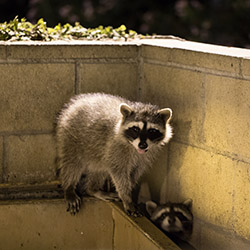
Raccoon Control, Trapping & Removal Services
We can rid you of Raccoon problems safely and efficiently
Raccoons are difficult to ignore when they’re on your Dallas property, or worse yet, in your home. These nocturnal, lumbering creatures are notorious for tearing up landscapes (and garbage cans) and causing damage to attics with their waste and nesting habits. Female raccoons who are raising babies will often seek refuge in your Dallas area attic for a safe nesting space. Raccoon droppings are a breeding ground for parasites and diseases like raccoon roundworm, which can be transmitted to curious pets or your family. A raccoon that is out in the daytime is likely injured or rabid, so if a raccoon seems outgoing, please do not engage with it.
Humane Raccoon Removal
Our humane raccoon control and raccoon removal services will remove all raccoons from your Dallas/Fort Worth area home successfully. At Trutech of Dallas, our team of expert raccoon specialists have years of raccoon knowledge in order to conduct proper raccoon removal. Our environmentally-considerate raccoon removal methods will make sure that no animals are injured by our work at any point in the raccoon control process. When you work with Trutech of Dallas, you can have peace of mind knowing that all your wildlife problems are solved humanely and efficiently.
Trust the Dallas Raccoon Control Techs
Don’t wait until clever raccoons have scaled your Dallas roof and have settled down in your attic to call us; we also offer raccoon prevention to make sure you don’t have a problem in the first place! Reach out to Trutech’s wildlife team for professional Dallas raccoon removal and control services. You can sleep peacefully knowing that your raccoon problem was solved for good by one of our licensed and friendly professionals! Trutech’s team is ready to solve all your Dallas wildlife removal problems.
APPEARANCE
These small mammals are known for the distinct, black bandit-mask markings on their faces. Most raccoons weigh anywhere from 10 to 30 pounds and grow up to 3 feet long. Their bushy tails tend to add an additional foot to their total body length. Raccoons have dense, grayish-brown fur peppered with black and white, as well as a series of distinctive black rings on their tails.
DIET
Opportunistic and omnivorous, raccoons will eat just about anything they can get their hands on. Common meals include crayfish, frogs, turtles, fish, mice, insects, eggs, fruits, vegetables, nuts, and whatever they can scavenge from carrion and trash piles. They eagerly take advantage of vegetable gardens, unsecured garbage cans, pet food left outdoors, and even bird feeders.
HABITAT
Forests, marshes, prairies, and wooded areas near human habitations are ideal habitats for raccoons. The creatures prefer to live near a water source, such as a stream, lake, wetland area, or slow-moving river, but are highly adaptable and can learn to thrive in a variety of environments. They make dens in hollowed trees, rock crevices, and the abandoned dens of muskrats or similar animals. We most commonly remove raccoons from properties in Georgia, Texas, North Carolina, Louisiana, and South Carolina. Contact your local Trutech office today to learn about our raccoon removal and exclusion services!


